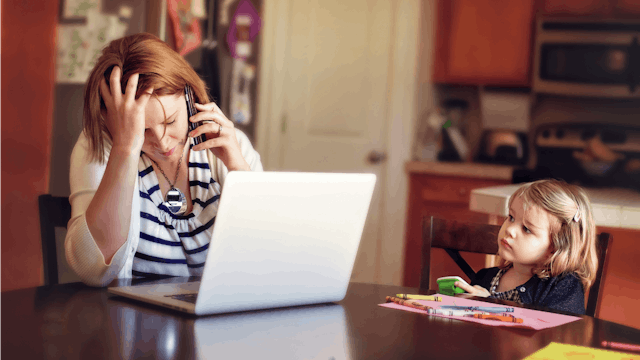When I Finally Realized I Needed Help For My Postpartum Rage

“I hate being your mother!”
That’s what I said to her.
My 3-year-old daughter stands in front of me. Silent. Stoic. I can see in her face that she wants to cry, but is fighting to hold it back.
But I don’t want her to hold it back. I want her to cry. I want to hurt her. Physically. Mentally. It doesn’t matter. I just want her to cry. (No, I did not raise a hand to her. Thank God.)
I yell. I scream. I threaten to throw away her most-beloved blankey. I order her to bed and slam the door on my way out. I’m angry. So very angry. The infraction? She wouldn’t poop when I sat her on the toilet.
What was wrong with me?
I wish I could say that was the only time I lost my control and raged at my child. But it wasn’t. I was so very angry so often, and Emma took the brunt of it. That’s not to say she was the only target.
I’m ashamed to admit that even my tiny infant got yelled at. She didn’t even fuss or cry much. She was a good baby. So why was I angry enough to yell at her for being, well, a baby? I even had to hand her off to my husband once because I was afraid I was going to shake her.
I told myself I was just stressed out from transitioning from one child to two. Caring for an infant and a toddler isn’t easy. At. All. Maybe it was stress from exclusively pumping or lack of sleep. Maybe it was the stress of potty training a stubborn, willful little human. It had to be stress. What else could it be?
When society talks about postpartum depression, we generally talk about sadness, hopelessness, disinterest. We don’t usually talk about the scariest symptom: rage. I’m not talking about your regular old, run-of-the-mill anger. I’m talking about the kind of rage that boils up inside you threatening to burn you alive. The kind that explodes from you like lava, filling the air with ash and toxic fumes, then
leaves you standing in the middle of the destruction wondering what the hell just happened?
Until the potty incident, it never even occurred to me that I might be suffering from postpartum depression. The next morning at work, I’m thinking back on my explosion the night before. This was the worst one yet, and I’m scared. I know my reaction was leaps and bounds beyond what the situation called for. I said things I would never have normally said. I threatened things I would never normally do. I don’t even recognize myself. What is wrong with me?
On my break, I Google “postpartum depression” and discover that rage is, in fact, a symptom of PPD. I immediately make an appointment with my doctor, but am still hesitant to say it’s PPD. What if it’s not?
What if there’s nothing wrong with me? What if I’m just a bad mom? I don’t even tell my husband about my suspicions. On the day of the appointment, I cry the entire way to the doctor’s office. I’m so relieved that I might finally have some answers. At the office I manage to pull myself together, but as soon as she walks into the exam room, I burst into tears again.
“It’s OK,” she says, “This is why you’re here.”
I’ve been on Zoloft since that day 8 months ago and I finally feel myself again. There are still days that are harder than others. And I can feel the anger creeping back in if I miss a pill or two, but it’s manageable. I no longer have to worry about whether or not I’m a danger to my child. I don’t want to hurt her anymore, and that is the biggest blessing.
If you’ve never experienced postpartum rage, you might be appalled by this story. Honestly, I’m still appalled by my behavior even knowing that I wasn’t mentally healthy at the time. But if this sounds like
you or what’s happening in your life, know that you are not the only one. Women like us, women who are struggling with strong, aggressive feelings we can’t control, we’re out there. We understand. You are not alone.
And there is help. Whether it’s therapy, meditation, medication, etc. – there’s something out there that can help you. It won’t be like this forever. So hang on, Mama. We see you. We hear you. We support you.
And it gets better.
This article was originally published on